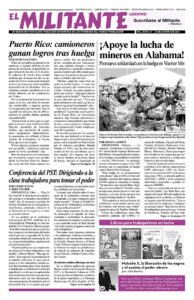Thousands of independent owner operator truck drivers and some trucking companies ended a two-day work stoppage July 22 after the Puerto Rican government agreed to extend for at least a year a 35% increase in mileage and hauling rates temporarily approved in December. This is the first major rate increase drivers have won in at least 15 years.
With no freight railroads on the island almost all merchandise, fuel and raw materials are delivered by truck. By the second day of the stoppage, more than 200 gas stations had run out of fuel.
“Now the challenge is to enforce the rates,” Félix Narváez, president of Camiones Unidos (United Trucks), an association of independent owner operators, told the Militant. The association is a member of the Broad Front of Truckers of Puerto Rico, which called the stoppage.
While some companies increased their rates, “they are still not paying the rates agreed to,” he said.
It will be easier for the owners of semi tractor-trailers, which haul bigger loads from the docks to the warehouses, to enforce the new rates. It’s the owners of the smaller “box trucks,” which make deliveries to markets, hospitals and small businesses, who will have the hardest time getting the bosses to pay the agreed minimum, Narváez said.
“Many companies have never paid the legal rates. We are paid so little sometimes we say, ‘Fixing that tire can wait a week. I have to buy food for my family.’” Narváez owns three box trucks. “I’ve had to take out loans just to keep the trucks running,” he said.
The Chamber of Commerce and the Chamber of Merchandise, Industry and Food Distribution denounced the rate increase.
There are over 40,000 “independent” trucks registered with the Puerto Rican government. The overwhelming majority, Narváez said, are owned by independent owner operators who have from one to five trucks. Some of the truckers in the Broad Front own 100 trucks.
The agreement won by the drivers was a slap in the face to the Financial Oversight and Management Board — imposed on the people of Puerto Rico by then-President Barack Obama in 2016 and continued by every president since. On the eve of the stoppage, Board General Counsel Jaime El Koury warned the Transport Bureau of Puerto Rico that the rate increase is “not in compliance” with the board’s fiscal plan, demanding the government put it on hold.
The board was created with dictatorial power over the fiscal affairs of the Puerto Rican government to ensure maximum payment to bondholders by slashing government programs and making working people pay for the economic crisis — making it even clearer that Puerto Rico is a U.S. colony.
“Our fight has exposed that the board is defending the interests of the big companies,” Carlos Rodríguez, organization secretary of the Broad Front, said by phone Aug. 6.
“The union movement here needs a boost,” he said. “We hope that what we are doing can motivate other compañeros.”
More than 90% of workers in Puerto Rico do not belong to a union, especially at the large pharmaceutical factories that dot the island. Many of those workers only get the federal minimum wage of $7.25 an hour.
Meanwhile, members of International Longshoremen’s Association Local 1740 ended their strike against Luis Ayala Colón company at the San Juan Port Aug. 5. That strike began July 17. The company handles 80% of maritime freight in Puerto Rico that comes from countries outside the U.S.
The strike began when the company tried to force forklift operators to keep track of their loads on computer tablets, giving bosses a tool to speed up work. The company agreed to assign that work to a unionized checker for 45 days while negotiations continue. The strike caused a backlog of some 9,500 containers.

